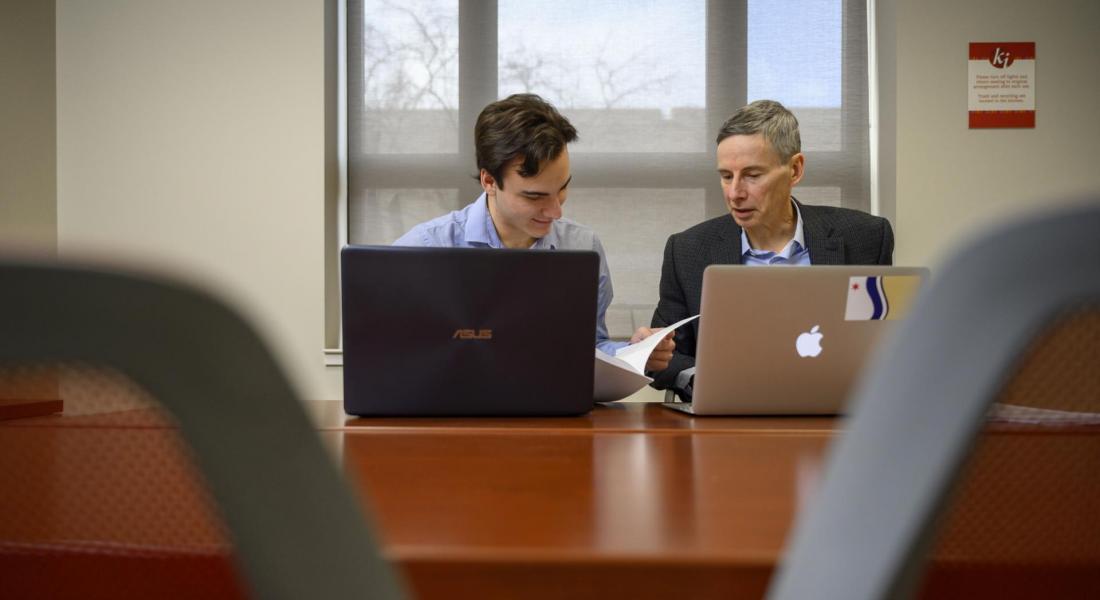
Kevin Angell '20 learned about the Kellogg International Scholars Program as a high school senior by accident, when, during a campus visit to the University of Notre Dame, he sat in on a class and heard a presentation about the program.
When he decided to attend Notre Dame, Angell knew he wanted ISP to be part of his undergraduate experience.
“I really wanted the chance for that mentorship and faculty engagement, and ISP really focuses on helping students develop as scholars in their own right,” he said. “Other programs are more project- or grant-based and may only last a semester. With ISP, the intention is that your journey as a scholar, from your research project all the way to writing your thesis in your senior year, is guided by your one advisor.”
ISP pairs sophomores with a Kellogg Institute for International Studies faculty fellow. Students assist professors in their research, and the partnership usually lasts for the duration of their undergraduate career.
Angell is now a senior with a triple major in economics, political science, and theology. And even as he prepares to graduate this spring, he’s already coauthored a working paper with a Notre Dame professor, presented at two conferences, and taken three graduate-level classes – all of which stemmed from his ISP partnership with Faculty Fellow Andrew Gould, an associate professor of political science.
Their pairing was a natural fit: Gould’s research focuses on issues related to religion and comparative politics, with an emphasis on research methodology – all topics of interest to Angell.
Gould said Angell’s “sharp mind and keen eye for careful reasoning” were evident even when he took the professor’s Introduction to World Politics class during his freshman year. Since then, Angell has assisted Gould in his research for an upcoming book, and in the process the undergrad has improved his own research and statistical skills.
“Kevin’s participation in ISP gave him opportunities to get into the process of academic research – everything that happens before a scholarly finding makes its way into print,” Gould said. “His work for me and for his other advisors gives him the experience and skills to produce his own work and to evaluate the findings of others.”
Gould added that ISP had benefitted him as well: “Working with a great ISP student like Kevin helps clarify a scholar's research agenda. You know what you are doing in research if you can explain it to bright undergraduates and give them meaningful roles in it.”
Through Gould, Angell has met other professors who have influenced his growth as a scholar, including Faculty Fellow Scott Mainwaring, a noted political scientist and the former director of the Kellogg Institute who returned to Notre Dame last year after several years at Harvard University.
Angell said his conversations with Mainwaring showed him the importance of “taking a step back from the research and seeing how it fits into the broader picture of political science.”
With the encouragement of his professors, Angell has taken graduate level courses in political science for undergraduate credit. A project he did in one of those classes grew into a working paper he coauthored with Notre Dame’s Jeff Harden, a professor of American politics and political methodology.
Their paper, entitled “Missionaries, Mechanisms, and Democracy,” uses data from the Varieties of Democracy project to examine the relationship between Protestant missionaries and democratic development in the non-Western world.
Angell presented the paper at the Northeastern Political Science Annual Conference and the de Nicola Center for Ethics and Culture's Notre Dame Fall Conference – opportunities that allowed him to receive feedback from other scholars and sharpen his research.
Meanwhile, his thesis, advised by Harden and Ethan Lieber, an assistant professor of economics, examines the impact of professionalization on policy innovation in state legislatures using a novel panel dataset. Among the questions Angell asks: Do professional state legislatures that meet regularly write more bills or have better policies? Do they adopt more policies that other states adopt?
Angell has received funding for his various research projects from the Institute for Scholarship in the Liberal Arts (ISLA), the Glynn Family Honors Program, and Kellogg.
Angell said ISP “has shaped my time at Notre Dame because of the structure it gives and the opportunities it provides, in terms of interacting with the faculty and connecting with others.”
Those connections have included friendships with other ISP students, particularly those in similar fields. Fellow International Scholars act as “sounding boards” to one another, he said, sharing information about graduate schools as well as tips for applying for grants. One student suggested summer opportunities that led to two internships for Angell – one with Notre Dame’s Wilson Sheehan Lab for Economic Opportunities, also known as LEO, and another with the private data science firm 84.51°.
But Gould has had the most impact on his development as a scholar.
“He’s been a great guide as I’ve been on my academic journey,” Angell said. “He’s helped me navigate what I want to do in the future. He’s been a really great resource.”
After graduation, Angell will work for Discover Financial Services in data analytics, but he hopes to eventually earn a PhD and work in academia.
His recommendation to other International Scholars: focus on building your relationship with your faculty mentor.
“You’re interacting with your professor in a very different way than you’re used to in class,” Angell said. “It’s much closer to a peer relationship than a faculty-student relationship, and you’ll get so much from it.”





